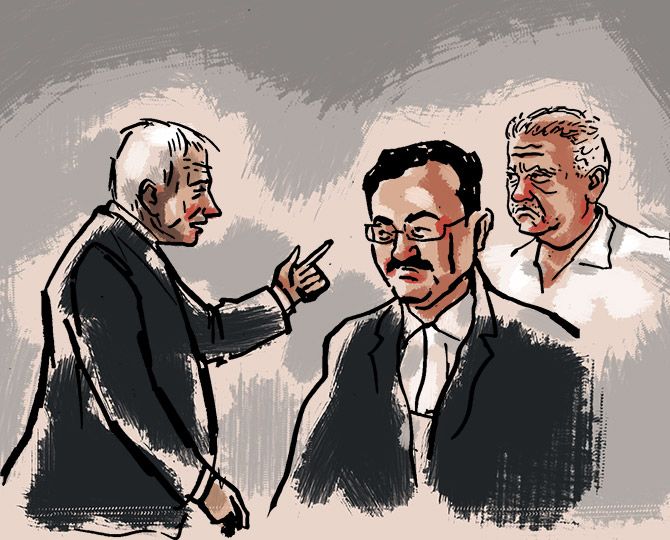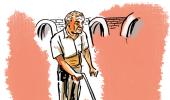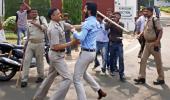'I am an old man. 64 years... Never used influence.'
'I am not a politician or a criminal. What influence?'
'Retired. I could not protect myself even (from fabricated charges)?'
'Have no money now either.'
'I don't want to die in custody in disrepute.'
Vaihayasi Pande Daniel reports from the Sheena Bora murder trial.
Illustration: Dominic Xavier/Rediff.com

A large crowd of prisoners waited in the courtyard of the Mumbai city civil and sessions court, Kala Ghoda, to board, single file, the prison bus going back to jail post lunch.
One African with a huge mop of frizzy hair. Two or three men with long beards, in kurta-pajamas and caps.
1-2-3...
A dozen young men in shirt-pant attire.
... 5-6-7-8-9-10-11-12-13-14-15...
Then, unbelievably, a tiny nazuk (tender) girl of about four, who was hoisted up, followed by her youthful mother.
16-17...
With each accused, stepped up one man in khaki. Many/most of these policemen had weapons.
18-19... 31-32-33...
Eventually, the overstuffed bus trundled off, with no less than 34 people aboard, on a warm, spring afternoon, everyone probably sitting on top of each, like a heap of Bombay duck. Maybe bound for the Arthur Road Jail or the Byculla Jail, central Mumbai. Or maybe 42 to 51 km beyond to either Thane or Taloja jails.
Either way, it would be no less than a one-hour ride in Mumbai's strangulating traffic.
It is a routine these prisoners must have been following for months, maybe years -- defenceless people, who had been degraded to numbered goods, faceless, stuck carelessly in a system.
What a nightmare come true.
While all the 17 are probably accused, not yet found guilty and a percentage will eventually be sentenced, it is still -- two years after one started coming to this court to report -- quite painful to look at these accused and not feel a wave of pity coming over you.
For their destiny. For their utter lack of serendipity.
Some of them might turn out to be indeed criminals -- thieves, murderers, forgers or rapists, who killed, robbed or maimed people. But statistics have shown, consistently, that most, who probably had wretched lives before they got to jail, will be let off, for insufficient evidence, after years mouldering inside, worse off, while the truly guilty might frolic in London in ostrich hide coats.
Nightmare come true? Is that what Peter Mukerjea feels every morning when he wakes up on the floor of Barrack 12 at Arthur Road Jail?
Does he awake to a nightmare and would rather have his dreams back?
When his eyes open, would he rub them wondering in which surreal world did his bed in his home in Bristol, England, or Marlow, Worli, south central Mumbai, get exchanged for a prison issue mattress?
Wouldn't it be better, does he think, to lapse into some not unpleasant fugue state, where numbing amnesia takes over?
On Monday, March 11, 2019, when Peter awoke in his cell, the burden of sorting real nightmares versus unreal dreams must have been particularly distressing as he got ready to go into court for the final hearing in his bail application, his third application in three years.
Would he have weighed his chances in his head that morning? Did he feel mildly positive? Simply resigned? Or cautiously hopeful?
What would have brought Peter a measure of happiness, on a difficult day, was discovering a group of eight to 10 ex-colleagues from Star India, a former cellmate (from the Kamala Mills case) and even his younger brother from Goa waiting to greet him at court.
Someone had bought halwa. Someone else a thermos of coffee with a proper ceramic mug. Another had brought a large McDonald's meal.
"Humbled. Humbled," Peter told them, hugging each one of them warmly (his brother twice), touched, no doubt pleased to have a few cheerleaders in court on this day.
The group then trooped into Courtroom 51 to listen to the remaining arguments of the bail hearing.
CBI Special Judge Jayendra Chandrasen Jagdale's eyebrows shot up puzzled, as he looked at the number of well-dressed people, who were not lawyers, teeming into his courtroom. He enquired of the lawyers and clerks who they were.
Peter's lawyer Shrikant Shivade: "Relatives."
CBI Special Prosecutor Bharat B Badami, contradicting: "Well-wishers."
Badami sombrely revealed that one of the persons was also a witness -- Peter's brother Gautam Mukerjea from Goa.
Shivade said the prosecution would probably never call the brother as a witness.
The CBI prosecutor was to finish his arguments against Peter's bail plea Monday.
Before that, Shivade, who had not been present at the last hearing on Friday, voiced his disapproval, on his client's behalf, for the arguments Badami had made that day, when he compared Peter's alleged long-distance role in Sheena's murder to that of the Lashkar-e-Taiyba's Muhammad Saeed in Mumbai's 26/11 terrorist attack, dramatically calling Peter a silent killer that made headlines all over.
Shivade, pained, in an emotional voice: "He should refrain from unwanted references. What all arguments he had done last time!? In no court is (this is permissible). I (Peter) am the son of a decorated military officer (Peter's parents, both doctors -- father, an anaesthesiologist; mother, a gynaecologist -- served in the Indian Army). How can he equate me (Peter) with this person?"
Lawyers always argue in the first person, with the 'I' or 'me' referring to their client, as if the lawyer is actually the client speaking.
Badami, defensively: "Person sitting in London claiming I am not around. You should not make an issue (about this)!"
Shivade: "It was reported in the newspapers."
Badami: "They might write anything," implying that he was perhaps misquoted.
Shivade explained that what Badami had said in court was in all the newspapers and the judge could see it.
Judge Jagdale, laughing: "I don't want to read every newspaper."
A copy of the tabloid Mumbai Mirror was pulled out and circulated. The judge also looked at it and the picture of Saeed juxtaposed with Peter's, the terrorist companionably sharing space with the former CEO, in the report.
Shivade, in a reasonable, but firm voice: "They can use legal phraseology in their arguments... Earlier, they had equated my client to (fugitive gangster) Dawood Ibrahim. We let it pass. They cannot play with my (Peter's) reputation. If you have evidence point it at the court. You don't have to resort to such tactics. Even a convict has rights."
He also said though Peter was presently the property of the court and lodged in jail, the prosecution could not be unfair.
At the back, Peter, the only person in the accused box on Monday, scowled, the anger and injury on his face an echo of his lawyer's statements to the judge.
Badami went off on a tangent, suggesting once more that the media was to blame for the reports of his Friday arguments and that he had no objection to having the media banned from the courtroom and the trial proceed in camera.
"Can't shoot the messenger," muttered a colleague.
Judge Jagdale cut him short: "You are well aware of the high court judgment on this...." He was referring to the Bombay high court ruling that permitted media coverage of the Sohrabuddin Sheikh encounter case.
Badami, protesting: "It (the Muhammad Saeed comparison) was used in a certain context..."
Judge Jagdale emphasised: "Comparison to whom, that is what they are objecting!"
Badami moved ahead with his final arguments dwelling on the crucial fact that Peter was finally being tried for murder: "There is no dispute about the offence. What is the mother charge? The mother charge is murder," he declared with a flourish.
He again accentuated, like he did last Friday, that a criminal conspiracy cannot be bifurcated.
Referring to Peter's alleged role in the crime: "There was a meeting of minds, here, there or anywhere." He added ominously, "Always hatched in the dark."
Badami underlined the issue of witness tampering, especially about the effect Peter could have on his son and Sheena's partner Rahul Mukerjea's upcoming testimony.
Additionally, the CBI lawyer said: "Other important witnesses yet to be examined. If he remains outside, there is every (chance) of tampering. The accused is a very influential person. Who will take care? This honourable court will take care?"
Judge Jagdale: "Which witnesses are you referring to? Apart from Rahul, who are you referring to?"
Badami said he had to examine Gautam Mukerjea. Shivade countered that saying he would depose in Peter's favour.
Vidhie Mukerjea, Indrani's daughter and Peter's adopted daughter, had also to give evidence.
Badami, then it seemed, again referenced the influencing of the media by Peter of the witnesses.
The judge questioned Badami; "What media reports? What they (interpret) has nothing to do with the case. Cannot jumble the case with a media trial. If you think they influence, don't read (the reports)... Which witness in your mind can be tampered with. One is his son. One is his brother?"
Badami said there were other witnesses: "Not a question of only the blood relatives. Even independent panch witnesses (who verify panchnama statements) can be won over. Vital witnesses. He is going to do what outside the court we don't know!"
Judge Jagdale, smiling: "But you should bring them (the witnesses) quickly then."
Badami expounded: "Cannot bifurcate the trial and bring witnesses for only A4 (Accused 4). Trial has to go on as a whole. Have to go as per the chargesheet. One witness is in a sealed envelope. Yet to be examined."
Perhaps the name of this one witness has been concealed. His meaning was not entirely clear.
After speaking about how Indrani's son Mekhail Bora's testimony revealed that both Peter and Indrani were against Sheena's relationship with Rahul, Badami pointed out: "Cross examination is the acid test. Truth will remain as is."
Shivade got up to refute a few of Badami's points in his final arguments on the bail plea.
He spoke about the few samples of material the prosecution was relying on to implicate Peter.
For instance, they had stressed on the importance of a certain sentence from Mukerjea house help Pradeep Waghmare's testimony. Shivade spoke about how that was an improvement (legal term for additional material built in later) because it had not been in the original statements.
The judge wondered about the wisdom of referring to material evidence at this stage in the context of a bail application.
Shivade then suggested keep the bail application pending for a short while till Rahul had testified.
The judge, intrigued, laughed: "That cannot be."
Shivade attempted to sort out Badami's witness tampering charge. He said that if Peter had wanted to influence Rahul he could have done that before he was arrested in 2015 and the CBI could not use influencing Rahul as an excuse for not granting bail and not bring him in as a witness till the end of the trial.
"Till I (Peter) was charge-sheeted Rahul was with me (Peter). If I (Peter) wanted to influence Rahul I could have done so then. Not my way of life."
Shivade suggested that if there was so much fear of witness tampering let the accused be under surveillance. Foot-noting earlier judgements, he stated that if a witness can be influenced it was the prosecution's failure.
The advocate said perhaps the bail could applied differently, with allowances for those said to be indirectly involved.
Shivade: "I (Peter) am an old man. 64 years... Never used influence. I am not a politician or a criminal. What influence? Retired. I could not protect myself even (from fabricated charges)? Have no money now either. I don't want to die in custody in disrepute."
Judge Jagdale smiled softly: "Oh yes, he is old. But he can't die."
Shivade: "That is what he feels."
Judge Jagdale: "I meet him every time I go there," on the judge's visits to the Arthur Road jail.
Shivade suggested it was not about physical incapacities, but the mental torture his client was suffering from, after over three years of imprisonment.
The lawyer said Peter was certain he was going die in jail in custody. "Kindly grant me bail."
With that, the bail arguments concluded. Peter headed back to jail, turning around to give a special wave to his brother.
- MUST READ: The Sheena Bora Murder Trial











 © 2025
© 2025